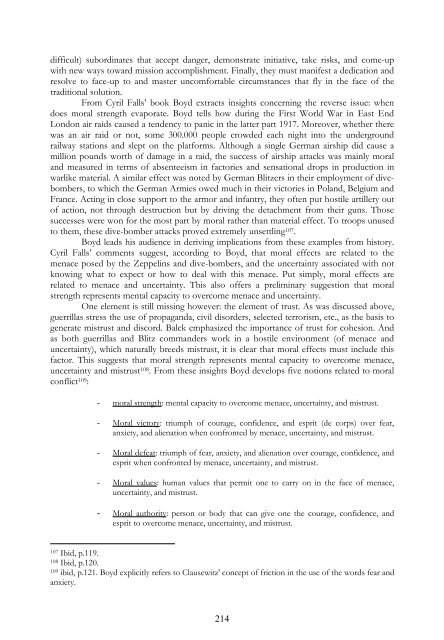Science, Strategy and War The Strategic Theory of ... - Boekje Pienter
Science, Strategy and War The Strategic Theory of ... - Boekje Pienter
Science, Strategy and War The Strategic Theory of ... - Boekje Pienter
You also want an ePaper? Increase the reach of your titles
YUMPU automatically turns print PDFs into web optimized ePapers that Google loves.
difficult) subordinates that accept danger, demonstrate initiative, take risks, <strong>and</strong> come-upwith new ways toward mission accomplishment. Finally, they must manifest a dedication <strong>and</strong>resolve to face-up to <strong>and</strong> master uncomfortable circumstances that fly in the face <strong>of</strong> thetraditional solution.From Cyril Falls’ book Boyd extracts insights concerning the reverse issue: whendoes moral strength evaporate. Boyd tells how during the First World <strong>War</strong> in East EndLondon air raids caused a tendency to panic in the latter part 1917. Moreover, whether therewas an air raid or not, some 300.000 people crowded each night into the undergroundrailway stations <strong>and</strong> slept on the platforms. Although a single German airship did cause amillion pounds worth <strong>of</strong> damage in a raid, the success <strong>of</strong> airship attacks was mainly moral<strong>and</strong> measured in terms <strong>of</strong> absenteeism in factories <strong>and</strong> sensational drops in production inwarlike material. A similar effect was noted by German Blitzers in their employment <strong>of</strong> divebombers,to which the German Armies owed much in their victories in Pol<strong>and</strong>, Belgium <strong>and</strong>France. Acting in close support to the armor <strong>and</strong> infantry, they <strong>of</strong>ten put hostile artillery out<strong>of</strong> action, not through destruction but by driving the detachment from their guns. Thosesuccesses were won for the most part by moral rather than material effect. To troops unusedto them, these dive-bomber attacks proved extremely unsettling 107 .Boyd leads his audience in deriving implications from these examples from history.Cyril Falls’ comments suggest, according to Boyd, that moral effects are related to themenace posed by the Zeppelins <strong>and</strong> dive-bombers, <strong>and</strong> the uncertainty associated with notknowing what to expect or how to deal with this menace. Put simply, moral effects arerelated to menace <strong>and</strong> uncertainty. This also <strong>of</strong>fers a preliminary suggestion that moralstrength represents mental capacity to overcome menace <strong>and</strong> uncertainty.One element is still missing however: the element <strong>of</strong> trust. As was discussed above,guerrillas stress the use <strong>of</strong> propag<strong>and</strong>a, civil disorders, selected terrorism, etc., as the basis togenerate mistrust <strong>and</strong> discord. Balck emphasized the importance <strong>of</strong> trust for cohesion. Andas both guerrillas <strong>and</strong> Blitz comm<strong>and</strong>ers work in a hostile environment (<strong>of</strong> menace <strong>and</strong>uncertainty), which naturally breeds mistrust, it is clear that moral effects must include thisfactor. This suggests that moral strength represents mental capacity to overcome menace,uncertainty <strong>and</strong> mistrust 108 . From these insights Boyd develops five notions related to moralconflict 109 :- moral strength: mental capacity to overcome menace, uncertainty, <strong>and</strong> mistrust.- Moral victory: triumph <strong>of</strong> courage, confidence, <strong>and</strong> esprit (de corps) over fear,anxiety, <strong>and</strong> alienation when confronted by menace, uncertainty, <strong>and</strong> mistrust.- Moral defeat: triumph <strong>of</strong> fear, anxiety, <strong>and</strong> alienation over courage, confidence, <strong>and</strong>esprit when confronted by menace, uncertainty, <strong>and</strong> mistrust.- Moral values: human values that permit one to carry on in the face <strong>of</strong> menace,uncertainty, <strong>and</strong> mistrust.- Moral authority: person or body that can give one the courage, confidence, <strong>and</strong>esprit to overcome menace, uncertainty, <strong>and</strong> mistrust.107 Ibid, p.119.108 Ibid, p.120.109 ibid, p.121. Boyd explicitly refers to Clausewitz' concept <strong>of</strong> friction in the use <strong>of</strong> the words fear <strong>and</strong>anxiety.214
















